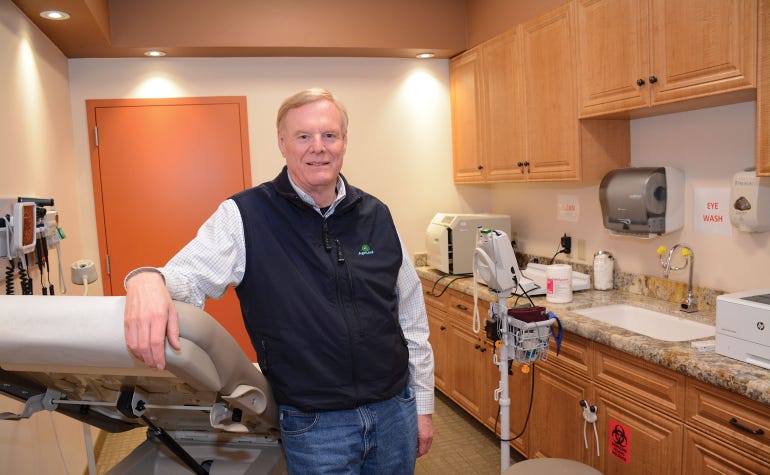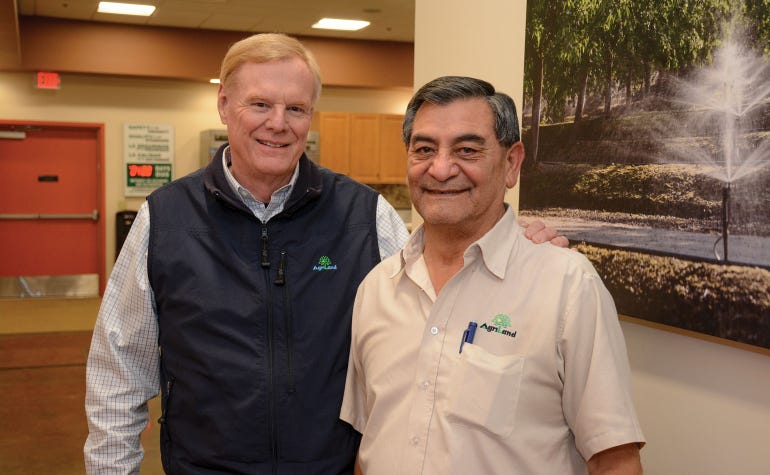May 15, 2019

AgriLand Farming Co.’s business model might feel out of place in the Midwest, but not so in California’s Central Valley and southern San Joaquin Valley. And what the company does to retain employees is a tactic any farm can use in its efforts to keep top talent.
With headquarters in Chowchilla, AgriLand serves landowners looking to establish partnerships on permanent crop installations, which in this region, increasingly come in the form of almond orchards and vineyards. AgriLand manages over 25,000 acres for hundreds of clients, with more on the way. It has a full-time staff of 275 employees, with various levels of skills and pay grades. As harvest heats up, that number may swell even higher with added contract labor crews.
But if you suspect the company has a problem keeping all those positions filled, think again.
“We don’t have a shortage of employees here,” says CEO Jim Maxwell. “You hear a lot of talk of shortages in other places. And I think the reason we don’t is because instead of devoting a lot of resources to employee search, we devote more to employee retention.”
Secret sauce
What’s the secret sauce? It starts with management putting themselves in the employee’s shoes and focusing on things that go beyond financial compensation.
“We really think about what we would want if we worked here; what would be important to us,” Maxwell says. “We try to add some of those pieces to this work experience.”

It may sound vague — until you see firsthand what that approach can do to build loyalty and keep your best people happy.
“For many years we had a culture where we shook hands. But if I go out to visit a crew now, more often than not, I’ll get a hug,” Maxwell says. “The reason is, they know we care about them.”
No doubt financial compensation still ranks high for most farm workers, as our most recent Farm Futures survey reveals. But when we asked farmers what made people want to work at their business, several nontangible answers also surfaced: friendships, being part of a team, autonomy, responsibility and camaraderie, to name a few.
Those little things add up. AgriLand holds a big harvest party each year for employees — a chance to celebrate, relax and maybe throw a water balloon at your boss.
“We have fun, and we’re all together,” Maxwell says.
In Chowchilla, many employees don’t speak English. So AgriLand sets up classes where a teacher comes in to help Hispanic workers learn English.
A small thing, but it matters.

A few years ago, AgriLand began offering college scholarships and laptops to employees’ children. The program stalled at first; the kids didn’t have good enough grades for college. Why? Neither the kids nor their families ever dreamed they would go beyond high school.
“Neither they nor their families expected college could be in their future,” Maxwell explains. “That was fairly eye-opening for us.”
The company took a new approach. It started encouraging kids to study, as early as seventh grade. Those with good report cards got a nice little payment and their picture in the newspaper. Personal pride started driving academic achievement, and for many, it was a springboard throughout high school.
“So now as these crops of kids became juniors, they did qualify for college,” Maxwell says. “We help them apply to college, and now there’s a number of our employees’ kids in California universities, two-year [programs] or tech schools.
“Participation has grown substantially since we started developing a culture of academic excellence in junior high school,” he adds. “In most cases, they are the first one to go to college in their family, unless they already had an older sibling in the program who is attending.”
A small thing — but it matters.
“When one of our employees sees their kid in college — something they didn’t imagine years ago — they know we care,” Maxwell says.
Wellness program
AgriLand frequently surveys its employees to learn what they need — and one of those needs was health care. So two years ago when AgriLand built a 37,000-square-foot equipment repair and maintenance facility, it added a preventive health care clinic and training center.
The clinic’s exam rooms are well-equipped and look just like any other medical facility. Doctors come in semi-annually to check on company workers.
“We know there’s a lot of untreated diabetes or high blood pressure, so this is an opportunity for our people to meet privately with a physician,” says Maxwell, who notes the company offers a cafeteria-style range of health care plans for a minimum cost.
But like other well-intended ideas, the health care plan needed tinkering at first. Maxwell discovered that most employees simply didn’t want to see a doctor.
“We had to coax people to come in,” he says. Then the company started offering a $50 gift card for anyone willing to get a checkup, on company time, no less.
That did the trick.
“I’m pretty sure we have saved some lives,” Maxwell says, referring to employees who discovered they had dangerously high blood pressure or onset diabetes.
Healthier eating
The health program led to a nutrition revamp. “We have ice chests full of drinks or granola bars spread all over the valley,” he says. “Some years back, you’d see a lot of sodas in those chests, but through nutrition classes, we made the decision we would no longer provide soft drinks. We even got rid of Gatorade and went to G2 because it has only 20% as much sugar.
“That was a big step forward. But when we dropped the soda pop, I got a fair amount of backlash from employees,” Maxwell recalls. “I said, ‘They’re not good for you.’ They said, ‘You really are my mother.’ ”
Is all this expensive? Maxwell says it’s only a few dollars more per acre, and is considered not only a good investment, but also the right thing to do. And it means that, for the most part, AgriLand doesn’t need to chase applicants when a position opens up.
“We have this nucleus of employees with long tenure here,” he says. “In many cases our core employee group is our best recruiter. They tell their friends what a great place this is to work. So we don’t feel like we’re out there chasing applicants.”
One of those longtime employees is parts manager Raul Flores. He’s been with the company 28 years. At first, it was just a job, he says. Then he began seeing benefits beyond his paycheck.
“I’m always learning something new,” he says. “When I first started here, I didn’t have any computer experience. Now I’m learning more and more about computers and working with one all the time.”
Job control
Like other satisfied farm employees, Flores appreciates autonomy. People don’t get micromanaged.
“Jim has always told us, ‘Manage your area just like it was your own little company,’” Flores says. “He’ll say, ‘The more successful you are, the more successful the company will be as a whole.’ Each manager is supposed to run their part of the business that way.”
Not everyone works at a farm with hundreds of employees. But Flores says there’s one piece of advice he would give any owner or operator, even if there is only one employee.
“Talk to them as a person and don’t talk down to them,” he says. “In some places I’ve worked at, management was talking down to you and not talking to you. Here, they talk to you as a person, one on one. That way people don’t feel like they are looked at as just a number.”

AgriLand’s approach is recognized by others. The Migrant Worker and Head Start Program gave the company an award for leadership in promoting compassionate care of employees and families.
“We have no tolerance for arrogance here of any kind on the part of any manager,” Maxwell says. “Whatever any employee does here, they know if they need my help, I’d go out there and grab a shovel and work right beside them.
“If the employees know you really care about them and their families, they will feel it,” he says. “They’re entitled to be treated with respect and dignity, and that’s what we do.”
You May Also Like




